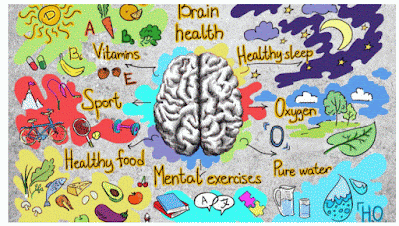 |
| Healthy Brain |
The brain is a monstrous, beautiful mess. Its billions of nerve cells-called neurons-lie in a tangled web that displays cognitive powers far exceeding any of the silicon machines we have built to mimic it. ~ William F. Allman
At the moment, there is no one recognized definition of brain health. Most existing definitions have only a general description of normal brain function or emphasize one or two dimensions of brain health. The US Centers for Health and Disease Control and Prevention defined brain health as the ability to perform all the mental processes of cognition, including the ability to learn and judge, use language, and remember. The American Heart Association/American Stroke Association (AHA/ASA) presidential advisory defined optimal brain health as “average performance levels among all people at that age who are free of known brain or other organ system diseases in terms of decline from function levels, or as adequacy to perform all activities that the individual wishes to undertake.”
There are 7 ways to keep your brain healthy :
1. Mental activities
- Learn a new language
- Use a different route to do your daily tasks
- Listen to or learn to play a musical instrument
- Learn a new skill like using a new software program and teach someone the new skill
- Use all your senses like eating a meal in a restaurant for the first time. taste your food, smell it, feel the crockery cutlery and furniture. observe the environment and listen to the voices of people.
- Word power: You are good at English but you can stimulate your brain by playing word games and at the same time enrich your vocabulary
- Play card games like gin rummy, poker, solitaire, and bridge
- Reading
- Go online
- Challenge and exercise your brain with jigsaw puzzles, sudoku, and other brain teasers
Participation in mental exercises won’t be effective if you're not overall healthy. Some of the factors linked to decreased brain function are diabetes, hypertension, obesity, head trauma, sleep apnea, clinical depression, bipolar disorder, and alcoholism.
2. Exercise
Exercise has a direct brain connection when you consider what it actually does. What we tend to overlook are the feedback loops that connect the brain to every cell in the body. Therefore when you throw a ball, run on a treadmill, or jog along the shore, billions of cells are "seeing" the outside world. The chemicals transmitted from the brain are acting the way sense organs do, making contact with the outside world and offering stimulation from that world. This is why the jump from being sedentary to doing a minimal amount of exercise - such as walking, light gardening, and climbing the stairs instead of taking the elevator - is so healthy. Your cells want to be part of the world. -DEEPAK CHOPRA
Some of the things you can do:
- Brisk walking
- Jogging
- Swimming
- Gardening
- Dancing
- Resistance training such as push-up
3. Get Connected
- Meet up with friends
- Join a class
- Participate in community projects
- Stay close to family, friends, and relatives
4. Healthy Diet
- Fish
- Fresh vegetables
- Nuts and seeds
- Fruits and berries
- Dark chocolate
- Whole grains
- Coffee
- Sleep well
- Relax
- Exercise
- A balanced life
- Tai Chi
- Meditation
- Yoga
- Fasten your seatbelt when driving
- Wear a crash helmet while cycling
- Put on safety gears while at work in construction sites
- Avoid smoking and using illegal drugs
- Boosts your memory function
- Better concentrationa and mental alertness
- Avoid mood swings and improve the brain's efficiency





